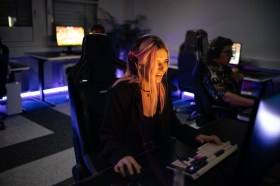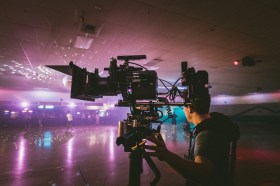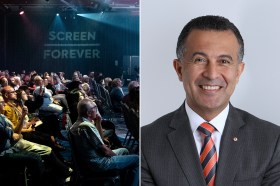The final report of the Senate Select Committee on Adopting Artificial Intelligence was released this week with 13 significant recommendations for protecting the rights of Australians, particularly those working in the creative sectors including film, television and media.
The 13 recommendations seek to introduce AI-dedicated legislation, force transparency from AI companies owned by multinationals, and ensure fair remuneration of creators of copyrighted works that are used for training data.
The report recommended that there should be a mechanism in place to pay creatives when those using generative AI had produced images, text or audio based on their work.
Chapter 4 of the report dealt with the impact of AI on specific industries, especially the creative industries and businesses relating to ‘music, music, games development, graphic design, architecture, book publishing, film and television, and fashion’.
The report said, ‘There is no part of the workforce more acutely and urgently at risk of the impacts of unregulated AI disruption than the more than one million people working in the creative industries and related supply chains.’
ScreenHub: A new manifesto for Australian TV production
AI and ‘unprecedented theft’
The report was strongly critical of the ‘unprecedented theft’ of Big Tech so far, and of the behaviour of executives representing Amazon, Google and Meta, who have consistently refused to be transparent or answer direct questions about their scraping of user data to train large language models like ChatGPT, Google’s Gemini and Meta’s Llama.
The committee’s chair, Labor senator Tony Sheldon, said in a statement after releasing the report on Tuesday that watching the companies dodge questions was ‘like sitting through a cheap magic trick – plenty of hand-waving, a puff of smoke, and nothing to show for it in the end.’
He called the tech companies ‘pirates’ that were ‘pillaging our culture, data, and creativity for their gain while leaving Australians empty-handed.’
AI: opportunities and risks
While acknowledging the many evolving opportunities that AI provides, the report suggests that if the behaviour of tech giants so far is anything to go by, we have everything to fear and much legislative work to do, though it could be argued that in many ways we are trying to put the bolted horse back in its stall.
Screen Producers Australia (SPA) has welcomed the report and its recommendations to balance innovation with protection.
‘This report is a vital step forward in addressing the opportunities and challenges AI presents to Australia’s creative industries,’ said SPA CEO Matthew Deaner in a statement issued today. ‘By calling for stronger protections for creators and rightsholders, the Committee has set a clear pathway for fostering innovation while safeguarding the livelihoods of those who bring Australian stories to life.’
ScreenHub: Do you want AI? A look at Senate inquiry submissions
Recommendations for regulation of AI
Key recommendations supported by SPA include:
- Regulating High-Risk AI: The introduction of dedicated legislation to regulate high-risk AI uses, ensuring general-purpose AI models like large language models are appropriately classified and governed.
- Safeguarding Creators: Measures requiring AI developers to be transparent about the use of copyrighted works in training datasets and mandating appropriate licensing and remuneration for creators and rightsholders whose work underpins AI-generated outputs.
- Strengthening Copyright Protections: Continued consultation with creative workers and rightsholders through the Copyright and Artificial Intelligence Reference Group (CAIRG) to address the theft of creative works by multinational tech companies.
The Australian Writers Guild (AWG) and its Authorship Collection Society (AWGACS) also welcomed the Committee’s recommendations on AI and its strong support of creators.
Claire Pullen, AWG and AWGACS Group CEO said: ‘It’s gratifying to see the Committee accurately describe the contradictory and farcical arguments of big tech companies that have taken Australian work without paying for it. It shouldn’t take a senate Committee to make it clear that this is stealing.’
ScreenHub: AI is bleeding into the VFX industry – here’s why that’s scary
Background and links on the Select Senate Committee on Artificial Intelligence (AI)
The Senate Select Committee on Artificial Intelligence (AI) has been conducting an inquiry and a series of hearings since March this year. As reported in ArtsHub and ScreenHub, a total of 236 submissions were tabled. You can see a list of creative organisation submissions linked below, including those from SPA, AWG & AWGACS, the Australia and New Zealand Screen Association and the Screen Composers and Production Designers Guilds.
- The Australian Association of Voice Actors (Submission 38)
- Independent Music Publishers International Forum (43)
- Copyright Agency (82)
- Arts Law (98)
- Australia New Zealand Screen Association (111)
- National Association for the Visual Arts (115)
- Media, Entertainment & Arts Alliance (137)
- Australian Publishers Association (138)
- Australian Society of Authors (139)
- Screen Producers Australia (141)
- Australasian Performing Right Association (169)
- Australian Production Design Guild (176)
- Australian Guild of Screen Composers (178)
- National Aboriginal and Torres Strait Islander Music Office (179)
- Australian Screen Directors Authorship Collecting Society (181)
- Australian Library and Information Association (183)
The 13 Recommendations made in the Report released this week, advise that the Government:
- Introduces new, whole-of-economy, dedicated legislation to regulate high-risk uses of AI, in line with Option 3 presented in the Government’s ‘Introducing mandatory guardrails for AI in high-risk settings: proposals paper‘.
- Adopts a principles-based approach to defining high-risk AI uses, supplemented by a non-exhaustive list of explicitly defined high-risk AI uses.
- Ensures the non-exhaustive list of high-risk AI uses explicitly includes general-purpose AI models, such as large language models (LLMs).
- Continues to increase the financial and non-financial support it provides in support of sovereign AI capability in Australia, focusing on Australia’s existing areas of comparative advantage and unique First Nations’ perspectives.
- Ensures that the final definition of high-risk AI clearly includes the use of AI that impacts on the rights of people at work, regardless of whether a principles-based or list-based approach to the definition is adopted.
- Extends and applies the existing work, health and safety legislative framework to the workplace risks posed by the adoption of AI.
- That the Australian Government ensures that workers, worker organisations, employers and employer organisations are thoroughly consulted on the need for, and best approach to, further regulatory responses to address the impact of AI on work and workplaces.
- Continues to consult with creative workers, rights-holders and their representative organisations through the Copyright and Artificial Intelligence Reference Group (CAIRG) on appropriate solutions to the unprecedented theft of their work by multinational tech companies operating within Australia.
- Requires the developers of AI products to be transparent about the use of copyrighted works in their training datasets, and that the use of such works is appropriately licensed and paid for.
- Urgently undertakes further consultation with the creative industry to consider an appropriate mechanism to ensure fair remuneration is paid to creators for commercial AI-generated outputs based on copyrighted material used to train AI systems.
- Implements the recommendations pertaining to automated decision-making (ADM) in the review of the Privacy Act, including Proposal 19.3 to introduce a right for individuals to request meaningful information about how substantially automated decisions with legal or similarly significant effect are made.
- That the Australian Government implements recommendations 17.1 and 17.2 of the Robodebt Royal Commission pertaining to the establishment of a consistent legal framework covering ADM in government services and a body to monitor such decisions.
- Takes a coordinated, holistic approach to managing the growth of AI infrastructure in Australia to ensure that growth is sustainable, delivers value for Australians and is in the national interest.
The full report from the Select Committee on Adopting Artificial Intelligence (AI).





